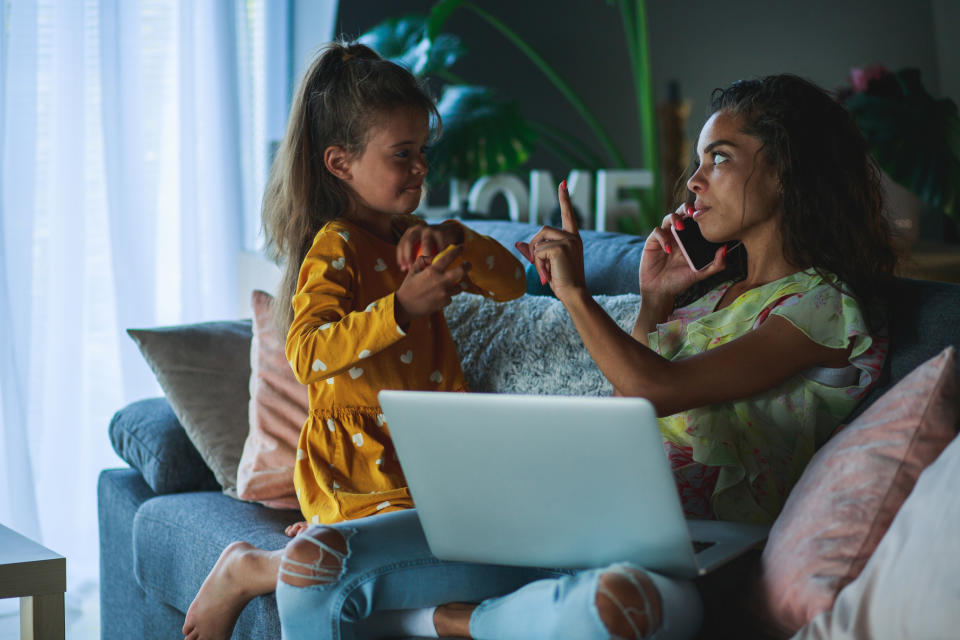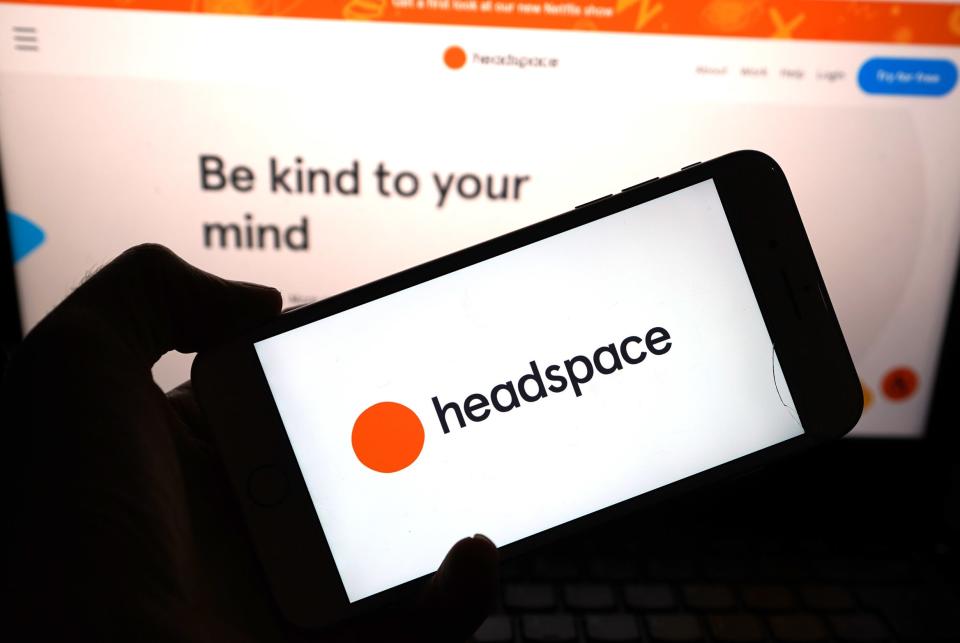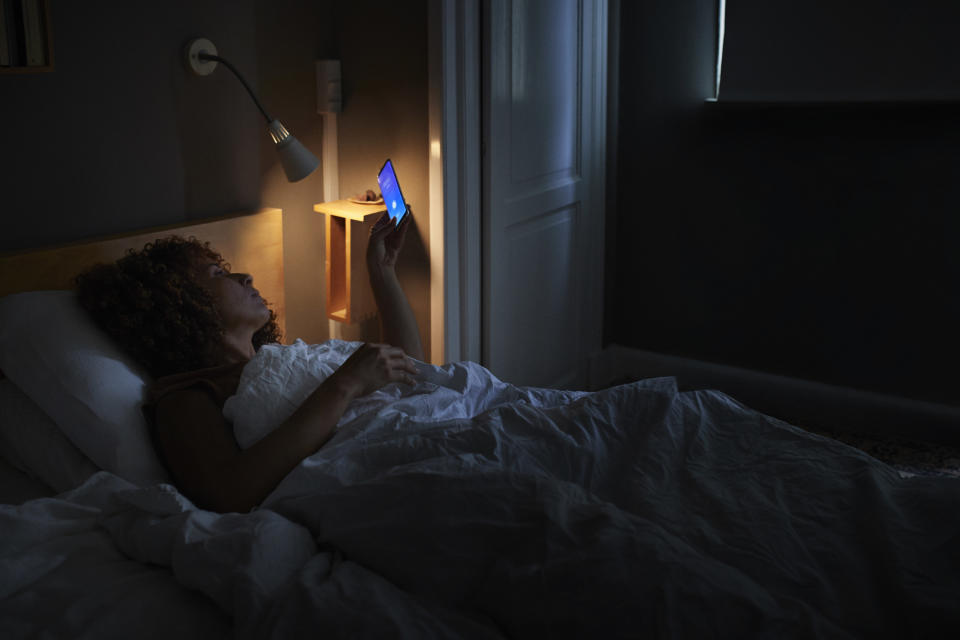"My Therapist Taught Me This": People Are Sharing The Habits And Techniques That Help Them Keep Their Anxiety At Bay
If you're one of the 40 million people in the U.S. living with anxiety, then you know how overwhelming anxiety can be and how difficult it can be to handle once it sets in.
BBC Studios / Warner Bros. Television Distribution / Via giphy.com
Recently, u/infinityx2_ asked, "What's an anxiety hack that has changed your life?" Many people were quick to answer, explaining a myriad of anxiety hacks, how to perform them, and how they've helped them with their own anxiety.
Before we dive in, it's important to note that feelings of anxiousness (or a clinical diagnosis of anxiety) do not show up in the same way for everyone, and do not have a one-size-fits-all solution. It's important to do your own research and figure out what works for you — ideally with the help of a trained professional. You can find further resources at the bottom of this post.
1."My therapist taught me to talk to my anxiety as if it's a person. We named it Lisa. So when my thoughts are spiraling out of control, and I'm getting overwhelmed, I'll say something like, 'Lisa, you're being really unhelpful,' or, 'Lisa, none of the things you're saying make sense because of xyz,' and so on."
2."I'm a therapist and often tell people I relate anxious thoughts to a kid who keeps interrupting you. You can acknowledge them and tell them you're busy with something else right now, and then return to what you are doing."

3."My therapist taught me to 'schedule' when I'm going to feel anxious about something. For example, if I'm anxious about Christmas, I can decide that I'll think about it the day before and feel anxious then."
"This doesn't always work perfectly, but it does help me not to dwell on things for a long time in the lead-up." —u/r0sad14zxx
4."Staying in the present moment. My anxiety is mainly triggered by worrying about shit that hasn't happened yet."
5."I took my therapist's advice of baiting my anxiety. One time, I started having a particularly strong attack come upon me while I was driving, so I began talking to my anxiety. I said, 'It this all you've got? No, no, go on, and get worse. Come on, make me pull over to the side of the road and pass out from hyperventilation. Do it! I don't care if I'm late, or if you make me bawl my eyes out. I'll just wait until you're done and then get on with my day.' Guess what my anxiety said? Nothing. I kept hyperventilating, but after another few minutes, the attack was over."

"I didn't have the exhausting aftermath to deal with, which is unusual. It doesn't work every time, but it helps me remember that this is a temporary state and that I will regain control shortly." —u/Realistic_Peak6340
6."Honestly, what has really helped me is meditation and mindfulness. It seems silly at first, but it really worked for me and helps me manage panic attacks."
7."Square breathing: Inhale for four seconds, hold your breath for four seconds, exhale for four seconds, and hold your breath for four seconds."
"Repeat as needed." —u/kalex925
8."My therapist once had me ponder what the 'best part of a panic attack' is. She was of the mindset that anxiety is your body trying to tell you something — to stop doing something, start doing something, etc. Once I looked at it that way, it was so obvious. The 'best part' of my panic attacks was that I was so embarrassed, I'd force myself to get away from people and be alone, whether I go to a bathroom or for a walk. I needed to be alone more."

"It seems like a wild question. But after realizing I needed to be alone more, my therapist 'prescribed' me alone time, 15 minutes every day. It helped. (Leaving my ex also helped.)" —u/Passton
9."My therapist taught me to do an intense aerobic exercise immediately for a short period (e.g. run up and down the staircase twice) when I'm feeling anxious, and my heart is racing. Your body is 'tricked' into believing the racing heart is from the exercise and not the anxiety, and your heart rate will likely come down naturally while you rest after the exercise."
10."For public speaking or social anxiety: 'Will this matter in 10 minutes?' Obviously, this doesn't work in every situation, but it helps when you stumble over a word or say something awkward."
"I can promise no one will be thinking about it 10 minutes from then." —u/depresso_james
11."Putting a bag of ice on my chest has helped immensely! I've only had about three memorable anxiety attacks, but I get overly anxious a lot. Whenever I feel one coming, I put ice in a bag, sit in bed with the lights off, and try to calm down."

12."CBT charts. When feeling most irrational or anxious, I had to document the stressful event, my immediate reaction, the scale of anxiety (e.g. feeling 70% stressed), and what I thought would be the outcome of a scenario. Then, I'd re-examine the situation, document the most likely and rational outcome, and then re-evaluate my stress levels after writing my way through the problem."
"Over time, I learned how to skip over the irrational fears and immediately consider the rational scenarios when coming across new stressors and uncertainties." —u/kalex925
13."Tell yourself, 'Future Me already did this!'"
14."I just started running, and it really helps. It sucks while I'm doing it while out of shape, but I found that I have less anxiety for most of the day when I run in the morning."

"I didn't even notice until I went a whole day feeling okay and made the connection. It's not a cure-all for sure, but it helps. I try to get a good run in if I have stuff to do later in the day. Maybe it’s a placebo, but, hey, if it works, I'll take it." —u/Mkbbbbb
15."Crying. It sounds stupid, but honestly, when I’m spiralling because of anxiety, a good cry helps me clear some the anxiety to think properly."
16."Changing the way I think about anxiety really helped me. Instead of saying, 'I'm so anxious,' I say, 'I'm so excited,' and start listing positive things to be excited and grateful for."
17."It takes consistent, sustained hard work, and dedication to healing. That's the only thing that truly works. For me, that looks like weekly therapy, daily meditation, mental health medication, sobriety, a truly clean diet, and challenging physical exercise."

"This coming from a PTSD and GAD diagnosis. I wish there were hacks that truly worked in the long term, but for me, the above has absolutely transformed my life. They heal the root causes as opposed to treating the symptoms." —u/westcoastwomann
18."Externalization: This is sometimes vague and described differently by different psychological sources, but in general, externalization is the act of separating the anxiety from the self. This can take a few forms and can be very simple, like referring to anxiety as 'the anxiety' rather than 'my anxiety.' It can also be about talking about the anxious feelings or thoughts, and externalizing them by bringing them out of your churning mind."
"This doesn't need to be done with a therapist, but they're better at coaxing it out than a random person would be. Still, just talking about it to anyone who would be willing to listen is often very helpful, and it's rather sad to hear how many people lack this form of outlet." —u/AbortionSurvivor777
19."When I was a teenager, one thing I learned in therapy was HALT: Hungry, Angry, Lonely, Tired. Is my anxiety being caused by some underlying problem that's exacerbating the situation at hand?"
"I am a total grump if I'm hungry or tired. Sometimes, I need a snack or recognize I didn’t sleep well the night before, and that might be why I'm in a bad mood or my anxiety is exacerbated.
If I'm already angry about something else, it can add extra stress and has nothing to do with the new thing causing me stress. If you feel lonely, reach out to someone or find something comforting. That is just one technique I use I find comes in handy at times." —u/TAA200002
20."Lowering my caffeine intake when I was so keyed up that I was triggered 24/7. I began drinking herbal tea; looking for things to be grateful for at the end of the day; writing a worry journal, wherein I dedicated one hour to paying attention to my fears, and then telling myself I could only worry until that hour the next day; meditating to bring me back to my body and the present."

"I recently went through my worst bout of anxiety. It lasted two weeks. I was on edge so badly that I thought my mind was breaking, and these things saved me. I’m a firm believer that it takes multiple tricks when it gets that bad. Now, I have these things whenever I need them — like prescriptions to take as needed." —u/Dissociating_biscuit
21."My grown daughter taught me that when I'm starting to feel anxious, I should use my senses — feel something around me, look at something, listen to something, and see what smells are in the air."
"I almost always get minor attacks at night, and this helps calm me so I can eventually go to sleep." –u/Puzzleheaded_Age6550
22."I listen to audiobooks by Claire Weekes, an Australian GP. Biggest takeaway: Being fearful of panic perpetuates the feeling of panic. By not being fearful of having a panic attack, you shorten the lifespan of the panic attack. It sounds impossible if you're someone who has panic attacks, but she's just the best. Promise."
"She wrote five books between 1962 and 1989 that were ahead of their time. I have them on my phone and listen when I feel a panic attack coming on." –u/FrankaGrimes
23."I recently read The Body Keeps the Score: Brain, Mind, and Body in the Healing of Trauma by Bessel van der Kolk. It talks about reconnecting with one's body as a way to heal from trauma and the various symptoms that accompany it, including anxiety. He discusses the merits of various treatments, but the silver bullet for me is weight lifting and yoga. They make me feel like I inhabit my entire body. Pushing myself physically keeps me present and aware, and more importantly, bound. I know I have my own back."

"This has enabled me to stand up for myself when I wouldn't have before, and this has greatly reduced my anxiety." —u/adhdmademenotdoit
24."Regular orgasms. I know it sounds a bit over the top, but it's true. Having regular orgasms really takes the edge off of life in general. Sometimes, when everything feels too difficult and overwhelming, I'll push myself to masturbate."
"It really helps calm me down and clear my mind, like post-nut clarity." —u/wifelost
25."My new mantra: 'Everything is neutral.' It reminds me that I don't need to have an opinion on everything that happens in the world. It helps me worry less, and it also helps with compassion fatigue. I'm not meant to worry about everything."
"When I read about some disturbing event or I have some negative thought and start to think, 'Oh, no, this is so bad, how am I going to go on?' I use my mantra." —u/Mella_20
26."The app Headspace is actually pretty awesome. It has SOS sessions that are only two to three minutes long, and they've talked me off the edge many times. These aren't so much meditation as they are a distraction with little exercises to distract you, but it helps to change your mindset."

"I get the app free through my college. I know many employers also offer free access to the app." —u/Ungrateful_Artichoke
27."Knowing what anxiety is and why your brain is bombarding you with this sensation can be very helpful in identifying how to overcome it. Understanding what the difference is between you and someone who has the same stressful thought but doesn't suffer from chronic anxiety is also helpful. The reality is, anxiety makes what you're anxious about seem like a credible threat. When there is a lapse in your anxiety, the same thoughts or fears often seem silly. Allow yourself to feel it, letting it flow through you until it eventually passes."
"Being mindful of that difference allows the person to accept the anxious thoughts or feelings, realizing that the sense of dread or danger is coming from the anxiety itself and not their own rational thoughts.
At the end of the day, you are not the only person who has had the same distressing thought that is causing you to suffer, and it can always be overcome." —u/AbortionSurvivor777
28."I'll use a FOG filter — Fact, Opinion, or Guess? Is what's causing me anxiety (often particular worries) a fact, opinion, or a guess? If it's fact, and I can support it with actual evidence, then I know what to do from there. If it's an opinion, I'll 'argue' it. If it's a guess, I'll look for evidence both for and against to help make it less of a guess."
"I also ask myself, 'What story am I telling myself?' By walking through this thought process, I feel more centered and detached from the anxiety. If I'm getting closer to an anxiety attack, I'll either go outside (because anxiety attacks feel like I can't breathe and am suffocating) or call my mom and ask her to distract me with conversation." —u/golden_ember
29."I get an anxiety attack when I'm trying to fall asleep — panicking, thinking of death. I start overthinking what is going to happen to us beyond this Earth. It terrifies me to not know, definitively, what happens after we die. So, I've started setting an alarm for 30 minutes to an hour. I convince myself that it's okay to doze off because my alarm is going to wake me. Most of the time, after the first alarm goes off, I've fallen into a deep sleep and just turn it off the alarm before going right back to sleep."

"It started after my dad passed away. At night, I drift into this mindset, and I can't sleep. I worry. By the time I'm turning off the alarm, my mind is too far into sleep mode to start worrying about my impending doom. It's worked so well for me." —u/Swimming_Football_56
30."My mantra. My therapist helped me create it. I have a lot of anxiety about not being ready or capable, so if I feel my anxiety bubbling, I say to myself: 'I am prepared. I understand. I am capable.'"
"It's not a cure, but it's one hell of a nice pillow." —u/FauxMango
31."People get anxious about things. Some are beyond our control but most we can do at least something about. To take the reason for being anxious out of the picture, there are five steps. 1) Name it. You'll have some control of most things, so identify it. For example, I lost my job. 2) List everything you can think of that one needs to do to solve what you’re anxious about on paper. That way, you can see how many things you know of that you can do to help yourself. For the job example, everything I can do to get a job. 3) Come up with an honest percentage of how much effort you've put into solving what you can control of the problem. 4) Say out loud, 'I can say I've done X% of what I need to do to solve this problem.' 5) Either you can say you have honestly done every last thing you can to make the issue better. You'll either be shocked to hear how little you're doing or how much you've already done. Now you have steps to take — a plan."
"If you've done 100% of whatever it takes to fix the issue, good. You did your part. Continue doing what you are doing, and be patient. You are already taking the steps you need to, so eventually, it will work out.
If you're like the rest of society, you'll see you haven't actually given it 100% or done 100% of what's needed. Great! Now, you also have a better idea of what you still need to do, and that becomes your plan.
Having a plan and then doing what you need to do is a way to assure a positive outcome. Suddenly, your situation is now in your control, and you have created a clearer path. Either way, what have you got to worry about?" —u/theurbanpoppy

